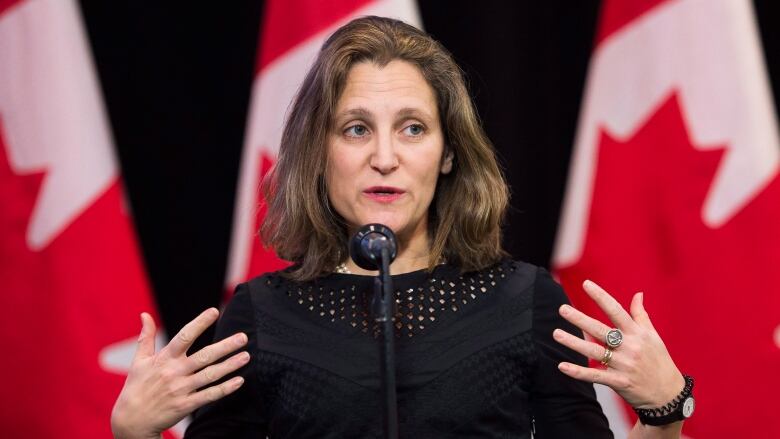Russian diplomats interfered in Canada's democracy, Ottawa says. Did they meddle in our election?
Announcement of expulsion of 4 Russians uses 'diplomatic boilerplate' without giving details

When the Canadian government announced it would expelfour Russian diplomats in retaliation for the poisoning of an ex-spy in Salisbury, U.K., it raised questions as to whether Ottawawas accusing Moscow ofinterferingin Canada'smost recent election.
In a statement, Foreign Affairs MinisterChrystia Freelandsaid the four hadbeen identified "as intelligence officers or individuals who have used their diplomatic status to undermine Canada's security or interfere in our democracy."
What that meant, exactly, was left unclear. In an interview with CBC's Power & Politics hostVassy Kapelos,Defence MinisterHarjit Sajjanwas asked if that meant the Russians had interfered in the 2015 federal election.
Sajjan wouldn't say, only offering that the "statement stands on its own" and that "for national security reasons, I can't go into details on that."
Healso didn't provide reasons whythe Russian diplomats weren't kicked out of the country earlier if ithad been discovered they were interfering in Canadian democracy.
Accusations of Russian meddling in elections havebecome a significant issue in the U.S. Special counselRobert Muelleris investigating Russian election interference and whether President Donald Trump's 2016 election campaign colluded with Russian officials.
'Shot across the bows'
But Wesley Wark, a University of Ottawa professor and expert on cybersecurity and intelligence, said Canada's statement was meant to send a message to the Russians that Ottawa won't put up with influence operations. Those can range from interfering with the diaspora community, to trying to develop influential political and business connections clandestinely all the way to election meddling, he said.
"You shouldn't read the message to indicate that the Canadiangovernmenthas evidence specifically of election meddling," Wark said in an email."On that front it is a shot across the bows."
He said the government's messagewas carefully composed and was, in part, "diplomatic boilerplate."
In 2017, theCommunications Security Establishment, the Canadian spy agency thatfocuses on electronic surveillance, issued a report about cyberthreat activity against the democratic process in Canada. It found that in 2015, the federal election was targeted by"low-sophistication cyberthreat activity" and that theperpetrators were likelyhacktivists and cybercriminals.
"However, to date, we have not observed nation-states using cyber capabilities with the purpose of influencing the democratic process in Canada during an election," the report stated.
Yet Marcus Kolga,a senior fellow at the Macdonald-LaurierInstitute's Foreign Policy Centre and an expert on Russianaffairs, said Russia can interfere in Canadian democracy in ways that don't necessarily include tampering with an election.
"I think that there's no doubt that there's also a lot of interference by members of the Russian embassy," he said.
Kolga said, for example, that for yearsthe Russians have been setting up organizations and churches that support the Kremlin's policies and objectives in order to sway public opinion.
"So if you're looking at democracy on sort of a really high level,there's the constant ongoing attemptsto manipulate," he said.
Russia hasdenied any involvement in the poisoning of former Russian spy Sergei Skripaland his daughter Yulia with amilitary-grade nerve agent in the U.K.But Western nations blame Moscow for the attack and have expelled Russian diplomats in response.
The four Russian diplomats who were expelled from Canada servedeither at the embassy of the Russian Federation in Ottawaor the consulate in Montreal, the government said in its statement.
Moscow announced Thursday it will retaliate against each of thecountries that expelled itsdiplomats by expellinganequal number of their representatives.
'Clearly crossed the boundary'
Christian Leuprecht, a political science professor at the Royal Military College of Canada and Queen's University, said Russia has two intelligence agenciesthat are embedded in every embassy the Federal Security Service of the Russian Federation (FSB) and the Main Intelligence Directorate (GRU).
"Everybody knows that some of those diplomats are going to be working for the intelligence service and some of them are genuine diplomats,"Leuprechtsaid.
He saidCanada and its allies have a pretty good idea who are the real diplomats and who are the spies. But these expulsions, he said, have sent a strong message.
"The signal to the Russians is we all understand that intelligence is a game and we all play at it and everybody tries to push the boundaries as far as they can,"Leuprechtsaid. "But you folks clearly crossed the boundary under what conditions you can deploy intelligence officers to our country."













_(720p).jpg)


 OFFICIAL HD MUSIC VIDEO.jpg)
.jpg)



























































































